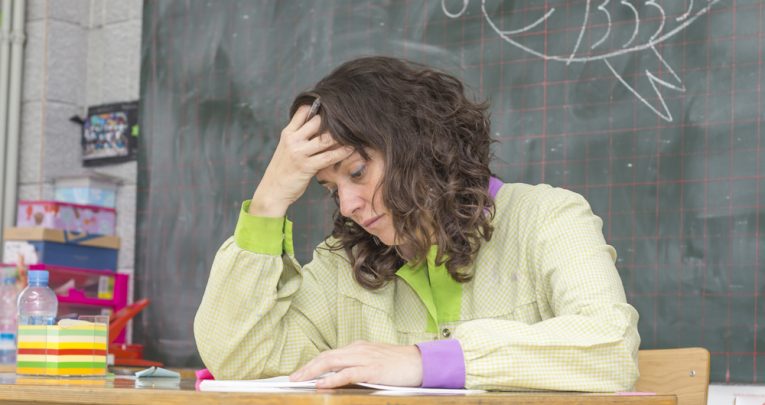A Spiralling Workload Is Taking The Heart Out Of Teaching

The actual teaching side is great, but that's only about half the job, the rest is marking, planning, resourcing, meetings, paperwork…

It’s hardly a ‘stop the presses’ moment, but new research suggests that almost four in 10 teachers are overworked.
While it’s the sort of thing that’s often talked about among those in the profession, it sometimes needs research like this to lay it all bare – even then, the news that another four in 10 primary school teachers have suffered from work-related stress in the last six months alone is pretty staggering. The sheer size of the teaching workload is a huge factor. According to a government teacher workload survey, primary school teachers work an average 54-hour week. You can see how teachers regularly hit this number of hours. While it’s not the same for everyone, a typical day might include teaching, planning, marking, meetings, paperwork, training sessions and break duty. The word ‘break’ is a bit of a misnomer – it doesn’t usually mean free time for primary school teachers, as the children will need to be supervised at all times. Camilla is a primary school teacher from South London. She told me: “I’d say it’s maximum 50% teaching and the rest is all the other things like marking, planning, resourcing, sorting and the like. When the kids leave it’s seriously hectic. I feel like I’ve been hit by a train. Having to be switched on 100000% of the time; you have no time for anything at all except focusing on the kids.” Although school often finishes at 3.30-4pm, teachers will regularly stay in the classroom tidying up, evaluating lessons, holding after-school clubs and creating wall displays, before going home to mark or prepare for the next day. Primary school teachers will work on weekends and in their holidays too. Camilla admits that she and her colleagues often fit in the equivalent of an extra full day a week by working during evenings and weekends. And although they have more holiday days than nearly every other profession, four in 10 primary school teachers will go into school during this time, and will spend a high proportion of their days off planning for the next term.
The situation is becoming a vicious cycle, with the heavy workload and poor work/life balance-putting people off becoming teachers, and ongoing shortages contributing to an already unmanageable workload.
How do teachers feel?
A primary school teacher from a school in Manchester admitted to me that she started working part-time because she found it nearly impossible to balance the workload with her family life. And, even after downsizing her working hours, she still struggled. She really wanted to get it right and would spend hours on the planning and preparation of her lessons. She told me: “It’s a particularly stressful job because there’s really not enough time to do everything. You can’t be a perfectionist and you have to get used to that.” It’s obvious that the workload and responsibility is emotionally and physically draining. The work-life balance is extremely tough and can be especially hard when you have a family of your own. That said, although primary school teaching in an incredibly demanding career, it is also a very rewarding one. The majority of teachers are happy in their jobs and most of them are not planning on leaving their profession in the next 12 months. Primary school teachers tell me that the benefits include an all-round varied workload, watching the pupils develop, helping the children learn and achieve, and building relationships with the pupils, parents and other teachers. It seems as though the most common reason for choosing to teach is the desire to work with children and a longing to make a difference. It’s not just about helping the children with their curriculum, but also about developing them emotionally and intellectually. As Camilla puts it: “I do absolutely love it. It’s exceptionally long hours, and for minimal pay, but you’re just so absorbed in it all because you have to be. Weeks go super fast because it’s all go go go. The actual teaching side of it is great. The kids are amazing, for the most part, and there are so many hilarious moments when they come out with the weirdest comments!”
What’s being done?
Randstad sent out a survey asking what specific changes would most improve teaching. Not surprisingly, more than half of teachers said they wanted less unnecessary paperwork. In 2014 a spokesman from The National Association of Head Teachers said that they were cutting superfluous paperwork and administration. ‘We will reduce unnecessary bureaucracy with the teaching unions as part of our ongoing programme of talks.’ The Department for Education claimed it was working ‘to tackle the issue of unnecessary workload which we know can lead to stress’. And, last year, Nottingham’s Education Improvement Board introduced a Fair Workload Charter which highlighted the importance of pay and training for teachers. It included policies such as a maximum of two hours of extra work a day on top of their allotted working times. Sadly though, the unprecedented level of work commitment expected of teachers doesn’t seem to be improving and more needs to be done to tackle the work-life balance of those who work so hard to educate our children.
Victoria Short, Managing Director of Randstad Education.










